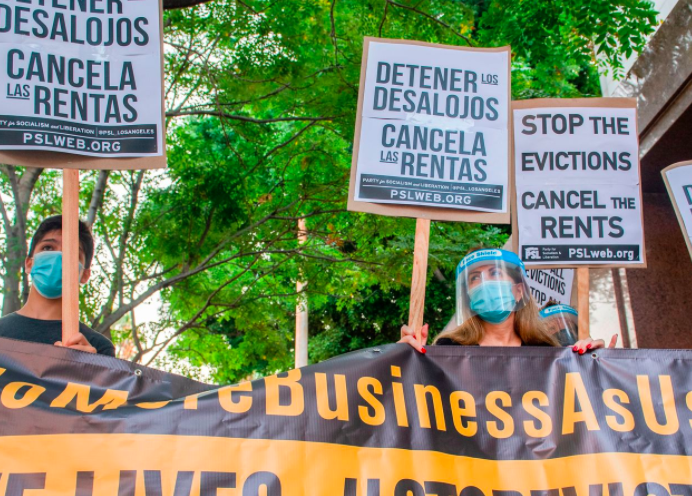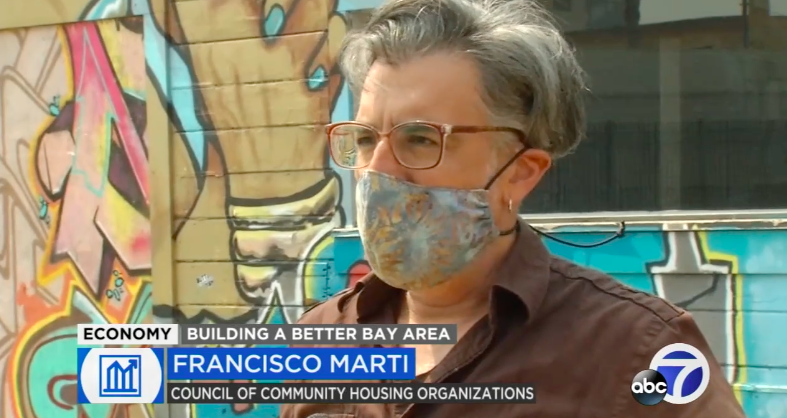The Mission isn’t as racially segregated as the Bay. Does that point to gentrification?
July 7, 2021
“Whether you can tie it to the dot-com boom, it’s intuitive. I think it’s really hard to point to it as causal, but it’s correlated. It’s not lost on anybody,” said Peter Cohen, the co-director of the Council of Community Housing Organizations, which is a nonprofit comprising tens of community-based affordable developers and tenant organizations.
Some immigrants tend to relocate where there are vestiges of their old homelands, or resources exist in their language.
“There are some [neighborhoods] like Chinatown, that are homogeneous and not necessarily in a bad way,” Cohen said. “The point is, how much resources, and how much agency do [these] communities have over its future, or is it being pushed by external forces?”
Read More
Debate reignites over San Francisco’s first public bank
June 21, 2021
It’s “potentially game-changing” in the realm of affordable housing, said Fernando Marti, co-director of the Council of Community Housing Organizations, a nonprofit affordable housing collective. San Francisco has been stuck in a system of building affordable housing tax credits and private capital with a diminished role from the federal government in public housing, he said.
“Ideally, this is something that allows us to create new models of affordable housing,” Marti said. “The public bank is a part of that discussion of something we can innovate that can get us beyond what we’ve been doing for the last 30 years. It’s going to be huge — creating a bank is not a little thing.”
Read More
Good news for recovery: $68 million for affordable housing
May 27, 2021
The timing is also critical for a big increase in housing preservation. Given the looming eviction cliff and the desire from real estate interests to speculate and profit from the pandemic, this is the time to step up our efforts to take at-risk building off the speculative market and into permanent affordability through nonprofit rentals, land trusts and co-ops. And to do so quickly, before The City faces another serious round of displacement in its already fragile communities of color.
Read More
May Day March and Rally in San Francisco Spotlights Essential Workers and Social Justice Demands
May 1, 2021
“I think, for a lot of us, it will always be a workers’ day that’s different from Labor Day — which is really a holiday created by the government to honor workers but different from us demanding our own day for workers,” said marcher Fernando Marti.
Read More
Bay Area cities want to end single-family home zoning, but will it create more housing?
February 27, 2021
The model might work best in more suburban communities with larger lot sizes and less expensive land, said Peter Cohen of the Council of Community Housing Organizations. He said cities getting rid of single-family zoning should focus on who these units will be serving and how they will help solve the region’s affordable-housing crisis.
“If the underlying premise of the movement around ending single-family zoning is that it’s going to make housing more affordable, my question is how? How is it going to make housing more affordable? What is the affordability strategy?”
Read More
Another Bay Area city to explore changes to single-family residential zoning
February 22, 2021
Peter Cohen, co-director of the San Francisco Council of Community Housing Organizations, said the coalition of community-based housing providers supports increasing density in areas that "make sense," like near transit or close to commercial streets.
"Permitting denser housing, by itself, does not make it affordable or necessarily result in racial integration," he said. "We should be careful in rezoning single-family areas that this does not result in house-flipping, development speculation and other activities that contribute to the displacement of existing communities."
Read More
Are 3D Printed Homes the Answer to the Housing Crisis? Probably Not.
February 10, 2021
“It’s just a lack of sufficient capital to spread that peanut butter around to ensure that housing is being produced for folks across the entire income spectrum. Construction itself is not going to answer that. It’s more of—I would call the focus on construction technology as kind of working around the edges. What’s really the issue is the staggering disparity of income and debt distribution that’s just polarized everything—and housing production, housing access, is no different,” Cohen said.
Though technology itself likely won’t be able to provide low-cost homes to everyone because it doesn’t address the funding issue, Cohen did reflect that 3D printing could play a role in the housing market. Specifically, he offered that new technologies—whether that’s additive construction or, more simply, pre-fabricated construction—could be used for in-fill of geographically unique pieces of land via accessory dwelling units (ADUs).
Read More
COVID-19 Exposed the Urgency for a Right to Housing
December 25, 2020
“There’s a long list of these companies that for the most part came into existence, or super-scaled up after that crisis,” says Peter Cohen, co-director of the Council of Community Housing Organizations in San Francisco. “Those companies are still here. They’re heavily capitalized. They’re not housing providers first. They’re financial investment firms that happen to be in the business of making money off real estate . . . So it could even be worse.”
Read More
Bay Area housing allocations must fight displacement, expand opportunities
December 8, 2020
Addressing these two issues — opening opportunities in high-resource areas and combatting urban displacement — will be key to allowing current and future generations of Bay Area residents the opportunity to choose their community based on their needs, preferences and access to resources and not have their futures constrained by their race or economic background.
Read More
San Francisco needs a rental housing inventory
November 29, 2020
A comprehensive housing database is tantamount to understanding the nature of The City’s housing supply, and the displacement and speculation which continue to plague our city and put San Franciscans at risk. This new tool will empower The City and the public with an information infrastructure to enforce laws which curb displacement and improve affordability. This housing crisis has resulted in major displacement of renters, extreme income inequality and prices that make it increasingly untenable for low-income and working-class everyday people to remain here.
Read More
California Auditor Slams State for Squandering Housing Funds
November 20, 2020
“Gentrification of the city because of all this concentration of wealth and the income inequality has basically shoved the whole middle income workforce out to fend for itself, and so it just adds that much more demand on the affordable housing side, which we're already struggling to keep up with because we have a shortage of land and money,” said Peter Cohen, co-director of the Council of Community Housing Organizations, a San Francisco nonprofit coalition of community-based housing developers and tenant advocates.
“That’s why a lot of housing activists are just as much fighting against displacement and gentrification as they are fighting for more affordable housing,” Cohen added.
Read More
S.F. voters passed new taxes. Will that hurt or help as city recovers from pandemic?
November 4, 2020
Peter Cohen, co-director of the Council of Community Housing, a coalition of affordable housing advocates, said he was “elated that S.F. voters continue to show up strong” when it comes to new revenue measures. Cohen strongly supported the real estate transfer tax increase.
Voters “just know in their gut that there are big winners in this town,” he said. “And they are fine with expecting those big winners to put out their paychecks.”
Read More
S.F. voters overwhelmingly support redistributive tax measures
November 3, 2020
Peter Cohen, co-director of the Council of Community Housing Organizations, said of Prop. I that "we are fortunate to have a new revenue source for affordable housing and housing preservation right at the time we need it most in the recovery from Covid-19 economic impacts."
"With the Housing Stability Fund legislation and the Rent Relief Fund legislation that were both adopted unanimously by the Board of Supervisors last week, this new Prop. I revenue can be put to immediate use," said Cohen. "It's a good outcome for affordable housing and housing justice."
Read More
A recovery plan requires funding: Prop I does it!
October 21, 2020
With forty years of experience as the voice of affordable housing in San Francisco, the 23 member organizations of the Council of Community Housing Organizations – working in neighborhoods from the Tenderloin to Chinatown, South of Market, Fillmore, the Richmond, and the Sunset, to the Bayview, Excelsior, Mission, and Castro – know that the singular critical element for more housing in our city is increased public investment. Private real estate money comes and goes with the vicissitudes of the global markets, booms and busts, and pandemics, but it is public investments that keep us building and responding to San Franciscans’ real needs over the long haul. Prop I is the real deal: increased funding for increased affordable housing. It’s a “Yes” vote!
Read More
Approaches to housing at heart of SF state senate race
October 10, 2020
“The fundamental flaw of SB 35 was and still is that it makes by right market-rate housing equally apply in at-risk urban communities as it is in suburban communities or in communities where there’s no displacement risk,” said Peter Cohen, CCHO co-director. “Given how critical our coalition’s housing organizations are in working on the ground to provide affordable housing and housing security, and in countering the displacement pressures on communities of color, we expect a close and constructive working relationship with San Francisco’s state senator. The housing urgencies of these times demand it.”
Read More
What happens to affordable housing in a market downturn
September 25, 2020
“There’s opportunity to invest in a time of a down market,” said Peter Cohen, co-director for the Council of Community Housing Organizations. “It’s a good time to increase public investment because land is more available. You can buy sites and sometimes buy entitlements. There may be less expensive land or less competition for contractors.”
While the market is experiencing volatility, Cohen said, the affordable housing sector in San Francisco has benefited from steady public investment over the last four decades. The $600 million Proposition A approved by voters last year, for example, is the largest affordable housing bond in city history.
“San Franciscans historically have been very good about public investment in affordable housing,” he said. “That’s our primary flotation device to get through these volatile swings in the private investment cycle. San Francisco has about 30,000 units of permanent affordable housing. If we hardwired ourselves to private real estate, we would not be able to afford to have that many.”
But affordable housing could lose out on units required as part of would-be high-end developments.
Read More
California eviction moratorium is ‘a real nightmare’ for renters to understand — here’s what you need to know
September 3, 2020
“Our members who are developers are working closely with our housing agency about how to reconfigure the reserves we’re required to have while supporting our tenants,” Fernando Martí, co-director of the San Francisco-based Council of Community Housing Organizations, said in an interview. “The way we approach it is we have to figure out how to keep buildings going and keep tenants in place.”
Read More
Californians could be evicted if bill is not approved by Sept. 1
August 31, 2020
“The necessity of having to pay 25% of your income works for some people but for other people, it’s impossible” says Fernando Martí, co-director of the Council of Community Housing Organizations. Watch the entire segment here.
Read More
Community Op-Ed: In the “new normal,” teachers still need housing. Where will they live?
August 28, 2020
New Op-ed: Thank you to these San Francisco elected leaders for raising up Housing for Educators! While the pandemic rages on, educators are still in dire need of housing and community-based organizations must prioritize providing this affordable housing.
Read More
Epic Sacramento showdown over looming eviction tsunami
August 23, 2020
The change [to SB 1085] came in the wake of unanimous opposition to that provision of the bill by the Board of Supervisors, the Council of Community Housing Organizations, and affordable housing advocates citywide.
Read More




















